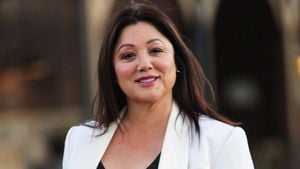With the impending school board elections, the stakes are higher than ever, particularly as they represent pivotal moments for communities across the nation. From overseeing funding allocations to shaping curriculum decisions, school board members wield significant influence over local education systems. This election season has captured heightened attention not just because of the candidates but also due to the monolithic financial backing some have received, making for quite the competitive environment.
Take Chicago, for example. The city is gearing up for its first-ever school board race, spurred by legislation passed back in 2021 which mandated the shift to an elected school board system. This move came as part of broader efforts to democratize school governance, allowing community members to have direct say over their educational environments. The law stipulates the election of 10 out of the 21 board members, with the remaining 11 — including the president — being appointed by Mayor Brandon Johnson. This unprecedented change is setting the stage for serious debates and discussions around educational priorities.
What's particularly noteworthy about Chicago's situation is the amount of cash flooding the race. Two primary organizations, Urban Center Action (UCA) and Illinois Network of Charter Schools (INCS), have amassed nearly $3.6 million combined just for this election. This financial muscle has garnered attention, especially since UCA and INCS have been vocal critics of the Chicago Teachers Union (CTU), which itself has been advocating for candidates who align with their views on educational policies. According to reports by The Sun Times, these independent expenditure committees can accept unlimited donations and have the power to run promotional campaigns supporting their chosen candidates, effectively allowing wealthy individuals and organizations to play kingmakers.
Juan Rangel, founder of UCA, explained their strategy, stating they aim to support candidates who are “independent thinkers” and prioritize balanced dialogues on educational issues. This is significant because it contrasts sharply with the CTU's push for candidates who align with its long-standing advocacy for public schools and traditional hiring practices.
Moving west to Arizona, the situation is comparably dynamic, particularly within the Mingus Union High School District. The upcoming election on November 5 will let voters choose three members out of six candidates for the district's governing board. Among these candidates is Taylor Bell, who emphasizes community involvement and safety as cornerstones of her campaign. With the mixing of different backgrounds – from health care to education – candidates bring diverse perspectives on tackling school funding and broader academic goals.
Bell's platform highlights the importance of academic excellence, student safety, and parent involvement, asserting the idea is to turn Mingus Union High School (MUHS) truly competitive among public schools. With safety concerns rising due to modern societal challenges, Bell stresses enhanced initiatives to protect students, alongside fostering healthier communication channels with parents.
A notable point raised by candidates like Bell revolves around the state of teacher recruitment and retention. According to her, competitive salaries are just the tip of the iceberg. “The quality of the workplace is just as important,” she asserted, believing teachers need support from their administration to thrive and succeed. Community involvement through appreciation programs crafted by parents could potentially strengthen ties and show teachers they are valued.
This notion of “teacher appreciation” is becoming increasingly relevant as districts assess their approaches to recruit and retain top talent, especially since many areas face shortages of qualified educators. Bills and bond measures meant to fund educational resources often rise and fall based on perceptions of how teachers are treated within their workplaces. Bell supports capital improvements such as new classrooms and facilities by advocating for capital bonds, showcasing her proactive approach to the position. Her candidacy reflects broader electoral trends across the nation, where issues like school funding and teacher support become pivotal campaign points.
Yet, the situation is not restricted to Chicago or Arizona. The tide of school board elections across the United States appears galvanized by similar circumstances, where significant money from pro-charter entities creates competing influences within local education systems. A surge of donations and political investments is likely to determine which school board members get chosen and the policies they endorse. Several groups have recognized the growing power of these positions, channeling resources to steer candidate selections.
For seasoned activists and new entrants alike, there's much at stake with these elections, as voters grapple with fundamental issues tied to education quality, accountability, and funding. The reality of how financial leverage changes the shape of local elections raises concerns about whether schools will reflect community needs or be swayed by outside influences. The need for transparency and grassroots involvement intensifies as communities navigate these waters.
With candidates on both ends scrambling to define their stances and win over constituents, the importance of insight beyond campaign slogans has never been more pressing. For many, the upcoming ballot will serve as more than just another election; it will embody aspirations for change, improvement, and perhaps even hope as communities strive to take charge of their schools. These dynamics will be pivotal as voters continue to contemplate how best to maneuver their choices come election day. Keeping all constituents informed, engaged, and vigilant is what fostering effective school governance is all about. The voice of community members expands significantly when they authentically influence school board decisions, potentially altering the educational framework for future generations.



